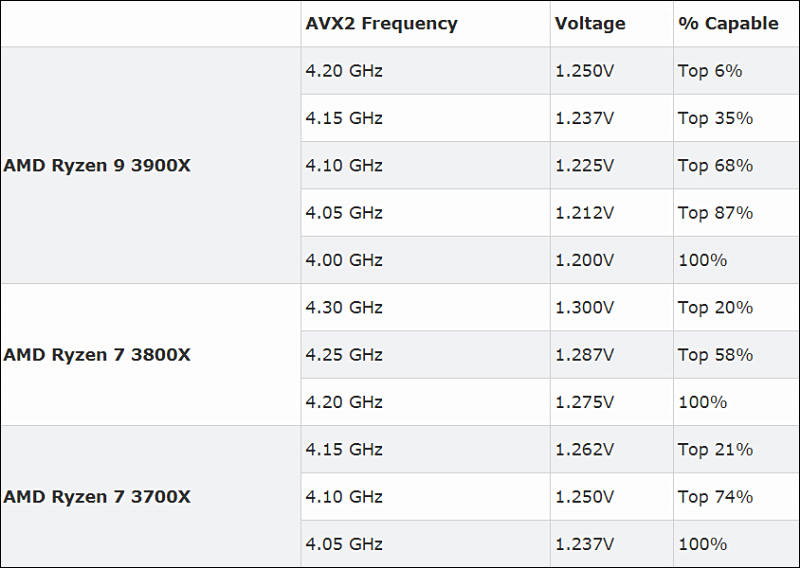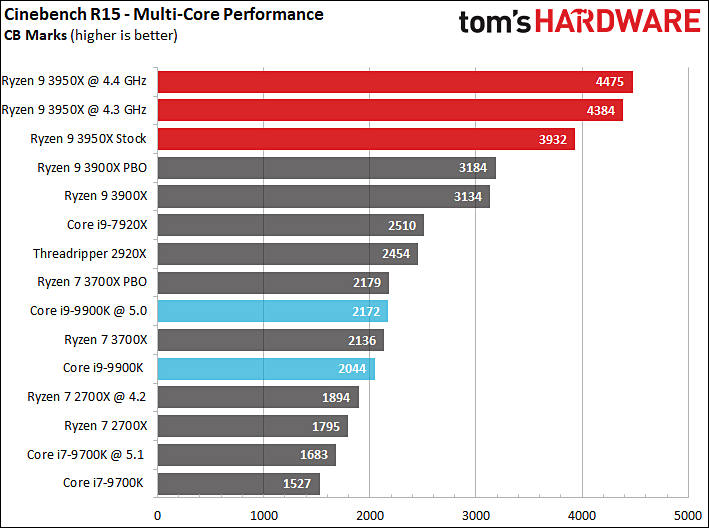
It allows to keep PV going, with more focus towards AI, but keeping be one of the few truly independent places.
-
Another models to appear soon
- Ryzen 5 3500 65W AM4
- Ryzen 7 3700 8-сore
- Ryzen 9 390012-core
-
Interesting article - TSMC 7nm still having big issues
- Only one core on our Ryzen 5 3600X processor will hit AMD's rated boost frequency. AMD confirmed some cores in Ryzen 3000-series processors are faster than others, which is denoted in Ryzen Master. That means that not all cores on can hit the single-core turbo frequencies. Instead, there are a mix of fast and slow cores.
- We recorded up to a ~75 - 100MHz difference between the fastest and slowest cores, with only one core reaching the single-core boost frequency. AMD hasn't shared the definition of the frequency that is acceptable for slower cores (it is rational to expect this to be the base frequency). While we recorded relatively small frequency deltas in our sample, it impacts performance and denotes a shift in AMD's binning strategy compared to the per-core turbo performance of Zen/Zen+.
- Previous-gen Ryzen processors can reach boost frequencies on all cores. Intel also says its processors can reach the turbo frequency on all cores.
- Workloads running on Ryzen 3000's slower cores experience lower frequencies than the chip's rated boost speed, and thus lower performance.
- The combination of Windows 10's new Ryzen-aware scheduler and AMD's chipset drivers allow the operating system to schedule single-threaded tasks into the fastest cores (thread pinning). AMD has previously disclosed the Windows 10 scheduler and the CPCC2 feature, but not that the combined features assign threads to the fastest cores. This functionality requires the latest version of Windows 10. This is somewhat similar to Intel's Turbo Boost Max 3.0 on its HEDT processors, but Intel doesn't set this as a requirement to reach the normal Turbo Boost 2.0 clock speeds.
- Older versions of Windows cannot schedule threads into the fastest cores as efficiently, thus resulting in lower clock frequencies and performance for Ryzen 3000-series processors in some workloads, which may be at the root of many user complaints.
- Most test utilities do not measure performance fast enough to catch bursty frequency boost activity. They also do not measure certain types of power states that could indicate higher boost activity.
- Slower cores could be a contributing factor to low overclock ceilings with Ryzen 3000 processors. Ryzen 3000 series processors hit all-core overclocks 200-300MHz below the single-core boost frequency. Slower cores simply may not be able to achieve/sustain higher frequencies, thus serving as the weakest link in the chain.
https://www.tomshardware.com/reviews/amd-ryzen-3000-turbo-boost-frequency-analysis,6253.html
It is also reason why AMD tightly instructed and controlled all major tests, none of them explained you this at launch time or made good tests outside latest Windows 10 build.
-
AMD Financial Director Kumar director told that present average profits for Rizen 2 CPUs is more than 50% of retail price. And it is record in AMD history (for whole lineup).
12 core model profits are around 85% of the price (16 is even more!), while 6 core model is much less.
AMD can sell you 16 core CPU for $199 and still live perfect, but their owners need money, now.
-
Interesting Newegg pricing on 16 core Epyc chips
- 7302 16 / 32 3.0 / 3.3Ghz - $1,019.99
- 7282 16 / 32 2.8 / 3.2 - $674.99
And it is always best chiplets, most cool, that go into Epyc.
Means that this time AMD want to rip maximally top rich gamers.
-
Ryzen 5 3500 coming soon
- Disabled HT, so 6 cores / 6 threads, purely marketing requirement to segment offers
- 3.6 GHz base clock
- 4.1 GHz max boost
- chiplets with worst binning
- 65W TDP (it is lie, of course)
- cost to manufacture of such complete CPU to AMD is around $20-25 :-)
-
Ryzen 3000 memory system
-
Boost statistics for single core
-
Marketing started to strike back
AMD is pleased with the strong momentum of 3rd Gen AMD Ryzen™ processors in the PC enthusiast and gaming communities. We closely monitor community feedback on our products and understand that some 3rd gen AMD Ryzen users are reporting boost clock speeds below the expected processor boost frequency. While processor boost frequency is dependent on many variables, including workload, system design, and cooling solution, we have closely reviewed the feedback from our customers and have identified an issue in our firmware that reduces boost frequency in some situations. We are in the process of preparing a BIOS update for our motherboard partners that addresses that issue and includes additional boost performance optimizations. We will provide an update on September 10 to the community regarding the availability of the BIOS.
-
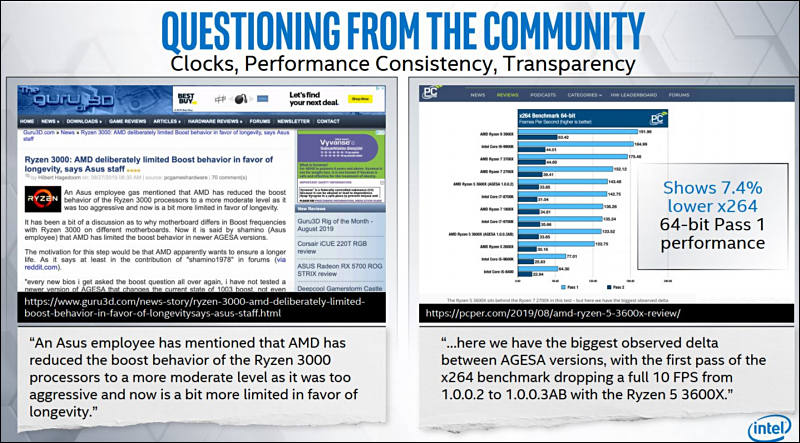
The original limits for Ryzen 3000 SKUs were:
- 3600 = 4100MHz (80-95°C) / 4200MHz (< 80°C)
- 3600X = 4200MHz (80-95°C) / 4400MHz (< 80°C)
- 3700X = 4200MHz (80-95°C) / 4400MHz (< 80°C)
- 3800X = 4300MHz (80-95°C) / 4550MHz (< 80°C)
- 3900X = 4400MHz (80-95°C) / 4650MHz (< 80°C)
Since then, it appears that the HighTemperature limit has been reduced further to 75°C (from 80°C). New SMUs also have introduced "MiddleTemperature" limit, but that gets disabled when PBO is enabled.
There's no doubt that the 'reviewer BIOS' is faster and sustains higher boost clocks for longer than the latest releases. Many chips aren't reaching their full boost potential even with the N11 'reviewer BIOS,' so AMD's fix might consist of returning to the original hard 80C boost temperature limit, which we're told hasn't been officially seen in the wild.

 sa9969.jpg800 x 443 - 100K
sa9969.jpg800 x 443 - 100K -
16 core model postponed
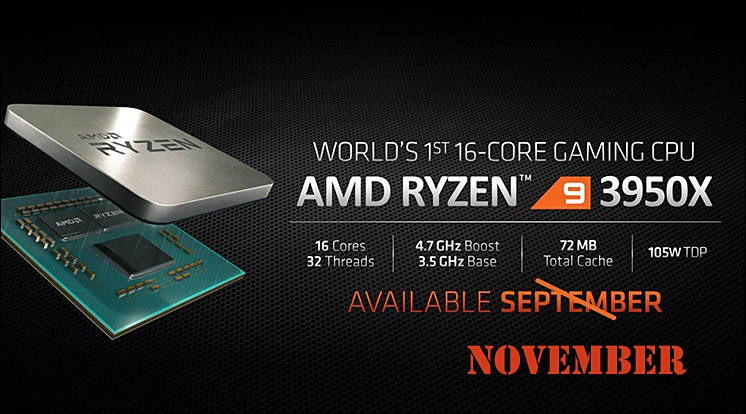
Actual 7nm yields are still bad, it seems, with lot of defects and very rare all 8 cores on chiplet can work.

 sa10127.jpg746 x 414 - 58K
sa10127.jpg746 x 414 - 58K -
Usual 3900 coming, with 65w bullshit TDP (real stock is around 120W)

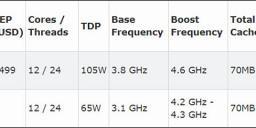
 sa10213.jpg800 x 240 - 37K
sa10213.jpg800 x 240 - 37K -
Not only AMD can't keep doing 3950X on time. But they also can't supply enough 3900X even.
Also note that it is till rumors of internal talks in AMD about fast degradation of 7nm chiplets. CPU life for current 7nm process can be limited by 2-4 years until significant max frequency drop.
-
WOW that's a big assumption, how can this be proven? I´m thinking on getting an AMD system for the end of the year maybe beginning next year, but a life expectancy of 2-4 years changes the decision quite radically, it makes little sense on investing big money on something for 7 to 10 years of use, and better to spend just for the price/performance/ minimum usability required. Please spare some more information when available.
-
It first leaked as AMD reduced actual boost frequency with new BIOS releases.
After big public noise they returned most of the initial boost, but reason of their initial behavior can be only the fast degradation of chiplets.Note that 7nm transistor is close to practical limits for such structure (and is not 7nm :-) ), also as you boost voltage and work on high temperatures such small elements degrade much faster and have much more internal leakage. It is good reason why Intel couldn't match 32nm Sandy Bridge overclocking frequency until the last 14nm generation, as 14nm leaks are much higher. If companies made 32nm chiplets using all the improvements used in last processes we had 5.1-5.2Ghz chips.
In reality 22nm-32nm are ideal for high performance CPUs where you can use water cooling, but you need smaller processes if you want big cache memory. So, ideal is the mixed process, where half of chiplet is being made using 22-32nm and half is made using high density 5-7nm and it is area where SRAM memory and some IO can reside.
-
Yes I'm aware of the electronic degradation on more small and small circuitry as of today, already they are starting to mass produce "5nm", but selling 500 to 700dll CPU that will start to slowly loose performance by the 4th year or maybe even fail. That's a serious issue.
I've read that at stock settings (no overclock) the processor is smart enough and will protect itself from risky voltages, lowering itself, and even shutting down if temps are high enough. I also read that latest bios have higher clocks but lower voltages and also some performance lost, maybe because of this safety measures, and in the way some damage control to avoid huge lawsuits because false advertising on clock speeds.
Please keep us informed about this I will also comment if something on interest is found.
-
Yep.
The question of longevity of the solution is something that piqued our interest but the bigger problem for AMD right now is to manufacture enough of the 7nm chipset pieces.
I think company try to delay big publicity on this until late 2020.
Actually main marketing of new Zen 3 can be that it is more stable and can live longer. Plus 4 threads SMT.
IPC won't increase much as I heard.
-
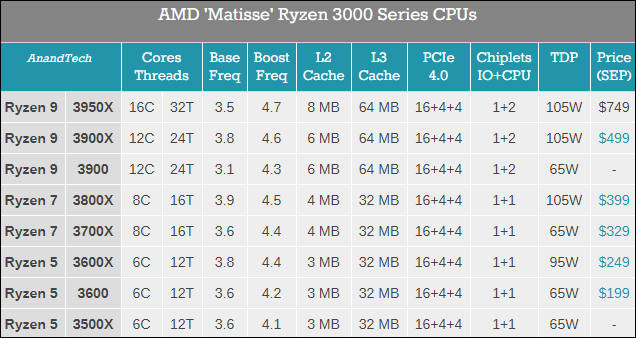
To keep margins high on existing CPUs, AMD decided not to sell 3900 and 3500X to end customers.
AMD also will restrict 3500X to select Chinese manufacturers only and will track it carefully to prevent any leaks of cheap CPU on the global markets.
AMD behavior considering Ryzen 3000 series is much worse than any Intel behavior and profits levels are unmatched (if you take into account EPYC prices they triple previous industry record, as EPYC level profits exist only in the illegal drugs and big pharma areas!).

 sa10349.jpg636 x 338 - 61K
sa10349.jpg636 x 338 - 61K -
AMD started slow marketing preparation to 16 core release
Special leaks show that Ryzen 9 3950X is only 10% faster compared to Ryzen Threadripper 2950X in Geekbench 5.
In real app with good memory load difference will be around 2-3%.
-
First deals
- Ryzen 3600X for $244 - https://www.newegg.com/amd-ryzen-5-3600x/p/N82E16819113568
- ASRock X570 PRO4 AM4 for $129 - https://www.newegg.com/p/N82E16813157886
-
AMD Ryzen developer and author of DRAM Calculator for Ryzen, has revealed a new power plan that nets an average increase of 200-250MHz on AMD Ryzen 3000 series processors.
According to the developer, the mod will work on all Zen 2 based processors including the upcoming Threadripper series.
https://www.techpowerup.com/review/1usmus-custom-power-plan-for-ryzen-3000-zen-2-processors/2.html
Howdy, Stranger!
It looks like you're new here. If you want to get involved, click one of these buttons!
Categories
- Topics List23,990
- Blog5,725
- General and News1,353
- Hacks and Patches1,153
- ↳ Top Settings33
- ↳ Beginners256
- ↳ Archives402
- ↳ Hacks News and Development56
- Cameras2,367
- ↳ Panasonic995
- ↳ Canon118
- ↳ Sony156
- ↳ Nikon96
- ↳ Pentax and Samsung70
- ↳ Olympus and Fujifilm101
- ↳ Compacts and Camcorders300
- ↳ Smartphones for video97
- ↳ Pro Video Cameras191
- ↳ BlackMagic and other raw cameras116
- Skill1,960
- ↳ Business and distribution66
- ↳ Preparation, scripts and legal38
- ↳ Art149
- ↳ Import, Convert, Exporting291
- ↳ Editors191
- ↳ Effects and stunts115
- ↳ Color grading197
- ↳ Sound and Music280
- ↳ Lighting96
- ↳ Software and storage tips266
- Gear5,420
- ↳ Filters, Adapters, Matte boxes344
- ↳ Lenses1,582
- ↳ Follow focus and gears93
- ↳ Sound499
- ↳ Lighting gear314
- ↳ Camera movement230
- ↳ Gimbals and copters302
- ↳ Rigs and related stuff273
- ↳ Power solutions83
- ↳ Monitors and viewfinders340
- ↳ Tripods and fluid heads139
- ↳ Storage286
- ↳ Computers and studio gear560
- ↳ VR and 3D248
- Showcase1,859
- Marketplace2,834
- Offtopic1,319


